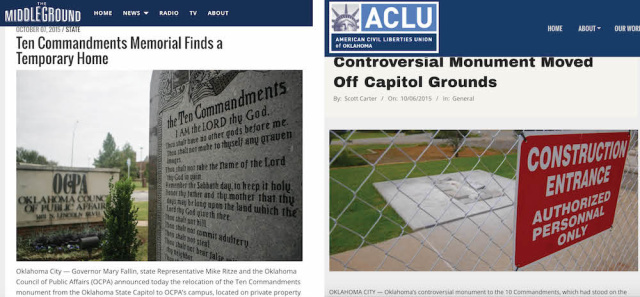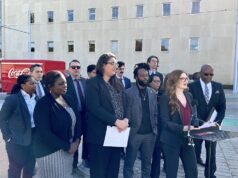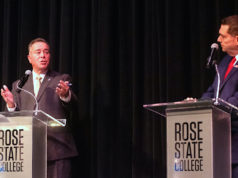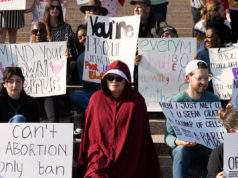

Two prominent political advocacy organizations have created “news” arms in Oklahoma, hiring experienced journalists to tell stories they believe the mainstream media miss.
While the ACLU of Oklahoma stands on the political left and the Oklahoma Council of Public Affairs stands on the political right, the public should read their “reporting” with caution, according to an OSU journalism professor.
“I think you’ve got to take all their reporting with a grain of salt,” said Joey Senat, associate professor with the OSU School of Media and Strategic Communications. “(You should have) an understanding that they may be coming at it from a certain viewpoint.”
The OCPA helped launch The MiddleGround News around April 1, according to managing editor Jay Chilton.
Interviewed in late October, Chilton initially downplayed the OCPA’s involvement in The MiddleGround News.
“There are people in common between the organizations, but they are two completely separate organizations,” Chilton said. “We have people who advise us, and people on our board who have a relationship with OCPA, sure.”
Chilton said he was not ready to share names of people on the site’s news board, and, at the time of his comments, MGN did not have an “about” page or any other information explaining its origins, founding or supporters online.
The former Norman Transcript photojournalist said MGN would launch a “full” site by Thanksgiving.
Days after his comments, the site added links to its TV and radio arms and an about page. That page, however, still does not note OCPA as having any relationship with MGN.

“That does present a problem because it doesn’t give full disclosure to the readers so they can make a better-informed evaluation of the information,” Senat said. “I don’t know why you would try to hide it. It wouldn’t be very successful in that case.”
The ACLU of Oklahoma, meanwhile, hired M. Scott Carter away from Oklahoma Watch in August to be “director of investigative communications,” according to executive director Ryan Kiesel.
“We’re just a couple of months into this right now,” Kiesel said. “It is something that we’re continually reevaluating what feels right, what’s working, what’s not, whether there’s a need for our reporting. Our job here isn’t to be in competition with other media outlets in Oklahoma.”
‘What to cover and what to write about’
Chilton and Kiesel expressed many of the same sentiments about needing to “report” on stories, people and ideas that other media may not be covering. But the concept of reporters being backed by two of the state’s leading advocacy organizations has raised questions among veteran journalists.
“It’s an advocacy group,” Senat said of both the ACLU and OCPA. “You’ve got to understand this is coming from an advocacy group. Even when I worked at the Tulsa World and the (Memphis) Commercial Appeal, executive editors and owners of newspapers had their own political agendas and will — and did — direct reporting in those ways.
“But even that said, you need to understand it’s even more likely when it’s (run by) an advocacy group. Whether it’s liberal or conservative, they’ve got a point of view that’s going to be reflected in what they’re putting up on a website. That begins — just as it does in a newsroom — with a decision of what to cover, what to write about.”
Kiesel said he has the final say on ACLU reporting.
“Ultimate publishing decisions come down to me as the executive director,” Kiesel said. “Scott has total access to me to bring me whatever story he feels needs to be told. He has that complete freedom and latitude to bring me those stories. Whether or not we choose to publish those stories is a decision that I’m going to make.”
Chilton said he makes the decisions at MiddleGround News, and he recalled the advice of his favorite UCO journalism professor.
“He said what you have to have is a go-to-hell fund,” Chilton said. “What he meant by that was not only financially, but also constitutionally, where you can tell the people who are above you in an organization that, ‘No, I’m not going to compromise my ethics, I’m not going to compromise the trust that I’ve worked to create with my readers, which my readers find in my reporting that I don’t go out to try to manipulate the issue.’”
Chilton said he does not apologize for the fact that his story selection focuses on free-market and individual-liberty issues, but he said he emphasized in his job interview how he would report accurately on people who hold his same beliefs if they “did something not very flattering.”
Eventually, Chilton did name the man who hired him earlier in the year: Michael Carnuccio, president of the OCPA.
Carnuccio is also “creator and host” of MiddleGround’s Sunday morning TV talk show on KOKH Fox 25, though his MGN bio omits his OCPA presidency. It does, however, say he serves on the board of OCPA Impact, a 501(c)(4) issue-advocacy group focusing on business growth.
In late October, the City Sentinel reported that Carnuccio’s presidential tenure at OCPA would end Dec. 31. Executive vice-president Jonathan Small will assume the title of president beginning Jan. 1.
Public relations or journalism?
Senat noted that one interesting part of the new OCPA and ACLU reporting efforts is the blurry line between public relations and journalism.
For instance, Carter’s first post on the ACLU of Oklahoma website and detailed ACLU-analyzed statistics regarding civil asset forfeiture. The post quotes three people: Kiesel, ACLU of Oklahoma legal director Brady Henderson and Sen. Kyle Loveless (R-OKC) who has filed legislation to reform CAF.
A subsequent story on CAF also quoted Henderson and involved some pushback from Oklahoma County District Attorney David Prater. The DA directed his critique of Carter’s piece to the McCarville Report because McCarville had published a link to the ACLU’s post along with a one-paragraph synopsis.
At MiddleGround News, archives show Chilton has written about CAF twice, once about a press conference Sept. 30 that featured comments from OCPA vice president for strategic initiatives Trent England and, ironically, Henderson, the ACLU legal director.
England is now listed on the MGN site as the host of MiddleGround Radio from 7 to 9 a.m. on 1640 AM The Eagle, as well as The Thoughtful Patriot from 9 to 10 a.m. on the same station.
Kiesel pointed to CAF as an example of considerable “overlap between what the ACLU is interested in and what the conservative organizations like OCPA are interested in.”
Dueling posts on the Ten Commandments
While both the OCPA and the ACLU of Oklahoma are working in support of civil asset forfeiture reform, the two organizations — and their news arms — are on opposite sides of the recent Ten Commandments controversy.
Chilton posted on the topic Oct. 7, covering the monument’s journey from the Oklahoma State Capitol to the grounds of OCPA headquarters. Nowhere in that post — nor in the asset forfeiture story mentioned above — is MiddleGround News’ relationship with OCPA mentioned.
“That should be put in there, and the Society of Professional Journalists’ code of ethics would require it,” Senat said generally of MGN’s relationship with OCPA. “Even [Public Relations Society of America’s] code of ethics would require full disclosure. When you’ve got a campaign of some sort, you’d want to disclose the client.”
Therein lies a difference of approach between the ACLU and OCPA’s publications — Carter’s work appears on www.acluok.org while Chilton’s appears on the separate MiddleGround News URL.
Carter — also a former Norman Transcript reporter — posted about the Ten Commandments monument one day before Chilton, quoting the ACLU’s Henderson again in that piece.
Chilton’s piece quoted Carnuccio and three other people opposed to the monument’s removal from the Capitol, while Carter’s piece led with Henderson’s comments praising the removal before also including a quote from Rep. John Bennett (R-Sallisaw) who said he was “appalled and disappointed.” Chilton quoted the same release.
Talking about themselves
Of eight posts by Carter on the ACLU site in October, seven quote either Henderson, Kiesel or both ACLU executives. Two of the posts are ACLU statements on public matters. Two others present as news stories about a proposed OKC median ordinance and include ACLU quotes. The only piece not featuring Henderson or Kiesel is a Q&A sent out by Gov. Mary Fallin’s office regarding Richard Glossip’s stayed execution.
Meanwhile, Chilton’s personal Twitter page notes he is a journalist at MGN. On it, he issued five tweets in October, three of which were pictures of OCPA events with the OCPA logo showing, and two of which were retweets of OCPA Impact regarding a MiddleGround News post titled The Teacher Shortage Crisis That Wasn’t.
“I wouldn’t say that journalism ceases to be journalism because it has a point of view,” said Kiesel, who had not heard of MiddleGround News until being interviewed for this story. “There are many examples of journalism that is powerful journalism because it has a distinct point of view.
“I think that the nature of the pieces identify what it is we’re trying to convey. We understand that there will always be a particular audience that gives any of our reporting or any of our investigation zero credibility simply because of who we are. I think that audience, over time, will get smaller.”
Kiesel and Chilton both said they hope to hire more writers and contributors to their organizations’ efforts.
“What I would like to do is have a newsroom with varied opinions across the spectrum,” Chilton said. “So within the pages of MiddleGround News, we could have an intelligent — not necessarily debate — but different views on the subjects we cover so that our readers can get a more full view of the subject.”
Senat said the two groups have more room to exist owing to shrinking traditional newsrooms and editorial staffs.
“Yeah, they’re going to fill a void. People want information,” he said. “If the traditional media don’t have the manpower to cover it, then it’s going to get filled some other way.”
He added that the onus for recognizing advocacy news groups for what they are ultimately lands on news consumers.
“What we want is for people to be news-literate, information-literate so people can actually critique the source of the information,” Senat said. “There are efforts to teach students, K-12, to start being able to critique it. I still see very educated and intelligent people falling for Internet hoaxes. And I see other people repeating information that is simply not true, so I think that is one of the dangers right now.
“We have more information, but we don’t necessarily have a public that is used to or has the ability to critique the value or accuracy of the information it receives.”




















